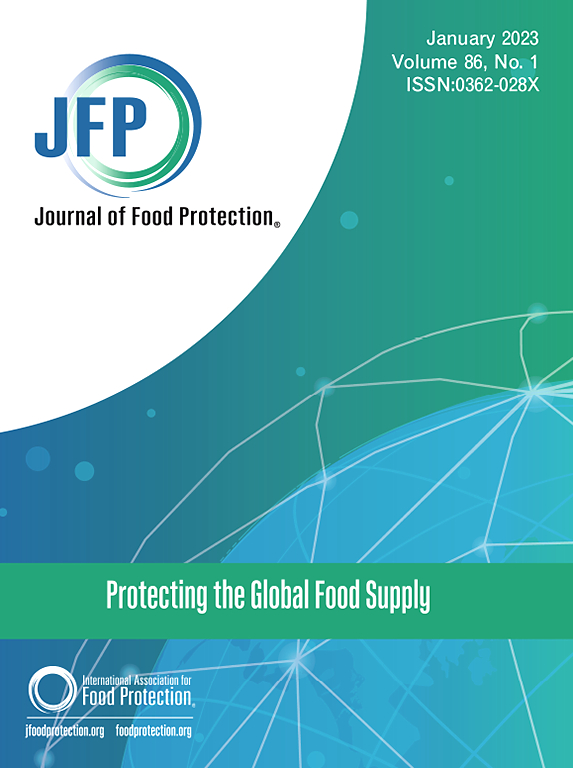Control of Alicyclobacillus acidoterrestris in Apple Juice with Natural Antimicrobial Glycolipid
IF 2.1
4区 农林科学
Q3 BIOTECHNOLOGY & APPLIED MICROBIOLOGY
引用次数: 0
Abstract
Food waste caused by microbial spoilage poses negative economic and environmental impact at a global level. Alicyclobacillus acidoterrestris is a spore-forming, thermophilic bacterium that can cause spoilage in shelf-stable apple juice by producing off-odor compounds, including guaiacol. This study investigated the efficacies of natural glycolipid (NG), a novel antimicrobial, extracted from fungal fermentation, in controlling vegetative cells and spores of A. acidoterrestris in apple juice during storage at 25 °C and 45 °C. Apple juice was inoculated with vegetative cells or spores of A. acidoterrestris, and supplemented with 0, 10, 50, or 100 ppm NG. Half of the samples were subjected to heat treatment at 185°F (85 °C), and the other half were not. Samples were stored at 25 °C or 45 °C for 28 days with samplings on days 0, 1, 3, 7, 14, 21, and 28. The minimum inhibitory concentration of NG was 4 and 8 ppm against spores and vegetative cells, respectively. The minimum bactericidal concentration of NG varied between strains, but was much higher than 100 ppm, which is the maximum recommended concentration for NG in juice and beverage products. During the 28-day storage, all tested concentrations of NG completely inhibited growth and outgrowth of A. acidoterrestris vegetative cells and spores at 45 °C, while the effect of NG was masked at 25 °C. Results also showed heating had some inhibitory effects against vegetative cells but not spores of A. acidoterrestris. In conclusion, we find NG suitable for inhibiting the growth of A. acidoterrestris in shelf-stable apple juice.
天然抑菌糖脂防治苹果汁中的嗜酸土Alicyclobacillus。
微生物腐败造成的食物浪费在全球范围内对经济和环境造成负面影响。嗜酸地酸环杆菌是一种孢子形成的嗜热细菌,它可以通过产生难闻的化合物,包括愈创木酚,导致货架稳定的苹果汁变质。研究了从真菌发酵中提取的新型抗菌剂天然糖脂(NG)在25°C和45°C条件下对苹果汁中酸地芽孢杆菌(a . acidoterrestris)营养细胞和孢子的抑制作用。在苹果汁中分别接种酸地草的营养细胞或孢子,并分别添加0、10、50或100 ppm的NG。一半的样品在185°F(85°C)下进行热处理,另一半不进行热处理。样品在25°C或45°C下保存28天,在第0、1、3、7、14、21和28天取样。NG对孢子和营养细胞的最低抑菌浓度分别为4 ppm和8 ppm。NG的最低杀菌浓度因菌株而异,但远高于100 ppm,这是果汁和饮料产品中NG的最大推荐浓度。在28天的贮藏过程中,在45℃条件下,所有浓度的NG都能完全抑制酸地草营养细胞和孢子的生长,而在25℃条件下,NG的作用被掩盖。结果还表明,加热对酸地芽孢杆菌的营养细胞有一定的抑制作用,但对孢子没有抑制作用。综上所述,我们发现NG可以有效抑制耐贮藏苹果汁中嗜酸线虫的生长。
本文章由计算机程序翻译,如有差异,请以英文原文为准。
求助全文
约1分钟内获得全文
求助全文
来源期刊

Journal of food protection
工程技术-生物工程与应用微生物
CiteScore
4.20
自引率
5.00%
发文量
296
审稿时长
2.5 months
期刊介绍:
The Journal of Food Protection® (JFP) is an international, monthly scientific journal in the English language published by the International Association for Food Protection (IAFP). JFP publishes research and review articles on all aspects of food protection and safety. Major emphases of JFP are placed on studies dealing with:
Tracking, detecting (including traditional, molecular, and real-time), inactivating, and controlling food-related hazards, including microorganisms (including antibiotic resistance), microbial (mycotoxins, seafood toxins) and non-microbial toxins (heavy metals, pesticides, veterinary drug residues, migrants from food packaging, and processing contaminants), allergens and pests (insects, rodents) in human food, pet food and animal feed throughout the food chain;
Microbiological food quality and traditional/novel methods to assay microbiological food quality;
Prevention of food-related hazards and food spoilage through food preservatives and thermal/non-thermal processes, including process validation;
Food fermentations and food-related probiotics;
Safe food handling practices during pre-harvest, harvest, post-harvest, distribution and consumption, including food safety education for retailers, foodservice, and consumers;
Risk assessments for food-related hazards;
Economic impact of food-related hazards, foodborne illness, food loss, food spoilage, and adulterated foods;
Food fraud, food authentication, food defense, and foodborne disease outbreak investigations.
 求助内容:
求助内容: 应助结果提醒方式:
应助结果提醒方式:


